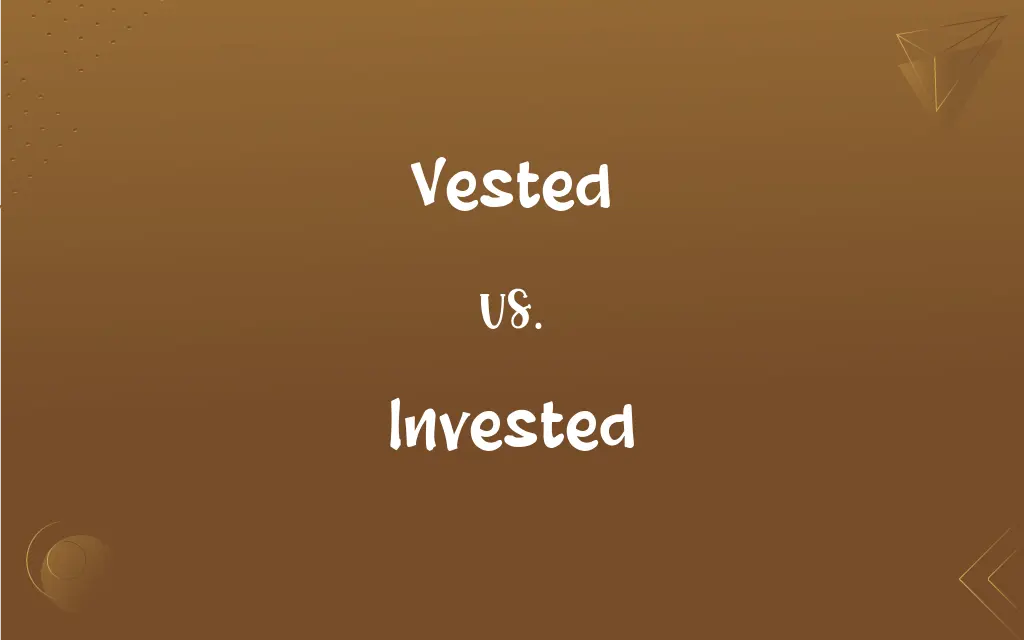Vested vs. Invested: What's the Difference?
Edited by Aimie Carlson || By Janet White || Published on December 12, 2023
Vested refers to having a legal right or interest, especially in a retirement plan or trust, whereas invested means to allocate money or resources with the expectation of achieving a profit or material result.

Key Differences
Vested typically refers to a legal or established right, often in the context of financial benefits or ownership rights, as in a retirement plan. Invested, in contrast, pertains to the allocation of resources, such as time, money, or effort, into something expecting future benefits.
When someone is vested in a pension plan, it means they have earned the right to receive benefits from that plan. On the other hand, being invested in a project implies putting in resources or effort to ensure its success.
The term vested is often used in legal and employment contexts, signifying a non-forfeitable right. Conversely, invested is used more broadly in finance, business, and personal development, denoting an active commitment.
Vested interests can also refer to personal stakes or biases in a particular outcome, while being invested in something can imply emotional or intellectual commitment beyond just financial stakes.
Vested connotes a guaranteed benefit or right, often as a result of time served or contributions made, whereas invested suggests an active choice to allocate resources with an expectation of future gain.
ADVERTISEMENT
Comparison Chart
Primary Context
Legal rights, benefits in employment or trusts.
Allocation of resources for future gains.
Usage in Sentence
"He is vested in the pension plan."
"She invested in the new startup."
Implication
Guarantee of rights or benefits.
Active participation with risk and expectation.
Emotional Aspect
Less commonly related to emotions.
Often implies emotional or intellectual commitment.
Scope of Application
Mainly legal, financial benefits, employment.
Broad, including finance, business, personal interests.
ADVERTISEMENT
Vested and Invested Definitions
Vested
Legally entitled to something, especially a benefit or pension.
She is vested in the company's retirement plan.
Invested
To put money into financial schemes, shares, or property for profit.
They invested heavily in the stock market.
Vested
Having a personal interest or stake in a matter.
He has a vested interest in the project's success.
Invested
Endowing someone with a particular quality or attribute.
He was invested with great authority.
Vested
Guaranteed to be retained or not lost.
His rights are vested under the contract.
Invested
Involving oneself deeply in a particular activity.
He's fully invested in his research work.
Vested
Conferred or endowed with a particular authority or right.
Power is vested in the board of directors.
Invested
To spend time, energy, or effort on a particular task or goal.
She's invested many hours in learning the piano.
Vested
Dressed or clothed, especially in vestments.
The priest was vested for the ceremony.
Invested
To formally confer a rank or title.
She was invested as the new chairperson of the committee.
Vested
(Law) Settled, fixed, or absolute; being without contingency
A vested right.
Invested
To commit (money or capital) in order to gain a financial return
Invested their savings in stocks and bonds.
Vested
Having full ownership rights, especially after certain conditions such as a period of service, have been met
Vested stock options.
An employee vested in a retirement account.
Invested
To spend or devote for future advantage or benefit
Invested much time and energy in getting a good education.
FAQs
Can vested rights be taken away?
Generally, vested rights cannot be taken away, as they are legally guaranteed.
What kinds of things can you be invested in?
You can be invested in financial ventures, personal projects, relationships, or any endeavor where you put in resources or effort.
Can someone be both vested and invested in something?
Yes, someone can be both vested (legally entitled) and invested (actively involved) in the same thing, like a business.
What does it mean to be vested in a retirement plan?
Being vested in a retirement plan means you have earned the right to benefit from it, usually after meeting certain criteria like years of service.
What does it mean to be invested in a project?
Being invested in a project means dedicating time, effort, or resources to it, often with the goal of seeing it succeed.
Is being vested only related to employment benefits?
While commonly related to employment benefits, being vested can also apply to other legal rights and interests.
Does invested imply financial involvement?
Invested often implies financial involvement, but it can also mean putting in time, effort, or emotional commitment.
Is the term vested used in everyday conversation?
Vested is less common in everyday conversation and is more often used in legal or employment contexts.
How does emotional investment impact relationships?
Emotional investment in relationships can deepen connections and commitment, but also makes one more vulnerable to emotional risks.
What is a vested interest?
A vested interest is a personal stake or bias in an outcome due to personal, financial, or other interests.
Can being invested in something lead to profits?
Yes, being invested, especially financially, can lead to profits if the investment is successful.
What does it mean to have a vested right?
A vested right is a legal right that is established and guaranteed, not subject to being revoked.
What types of investments can be made?
Investments can be made in stocks, bonds, real estate, businesses, education, and personal development, among others.
Can investing time in a hobby be beneficial?
Investing time in a hobby can be beneficial for personal satisfaction, skill development, and mental health.
How do you become vested in a pension plan?
You become vested in a pension plan typically after fulfilling certain criteria, like a minimum number of years of service.
How do vested rights affect employee turnover?
Vested rights, like pension plans, can affect employee turnover by incentivizing employees to stay longer with a company.
Can being invested in something be risky?
Yes, being invested, especially financially, can be risky as there's no guarantee of success.
Can a vested interest create conflicts of interest?
Yes, a vested interest can lead to conflicts of interest, especially if it biases decision-making.
Is it possible to be over-invested in something?
Yes, being over-invested, especially emotionally or financially, can lead to imbalances and potential losses or disappointments.
What happens when someone is fully vested?
When fully vested, an individual gains complete entitlement to a benefit or asset, without the risk of forfeiture.
About Author
Written by
Janet WhiteJanet White has been an esteemed writer and blogger for Difference Wiki. Holding a Master's degree in Science and Medical Journalism from the prestigious Boston University, she has consistently demonstrated her expertise and passion for her field. When she's not immersed in her work, Janet relishes her time exercising, delving into a good book, and cherishing moments with friends and family.
Edited by
Aimie CarlsonAimie Carlson, holding a master's degree in English literature, is a fervent English language enthusiast. She lends her writing talents to Difference Wiki, a prominent website that specializes in comparisons, offering readers insightful analyses that both captivate and inform.































































